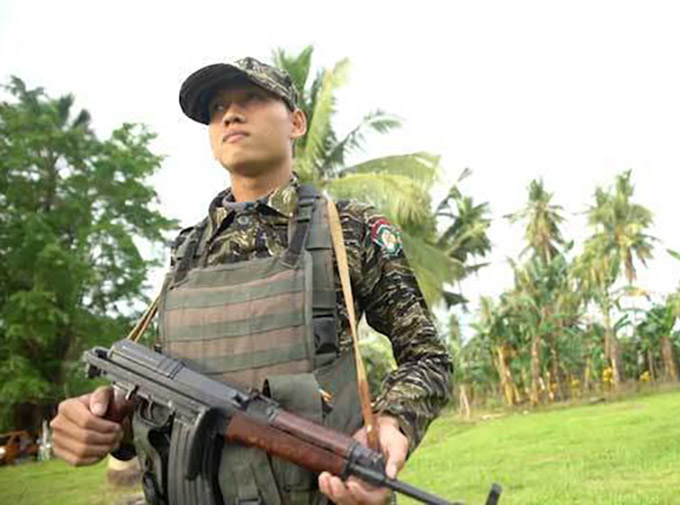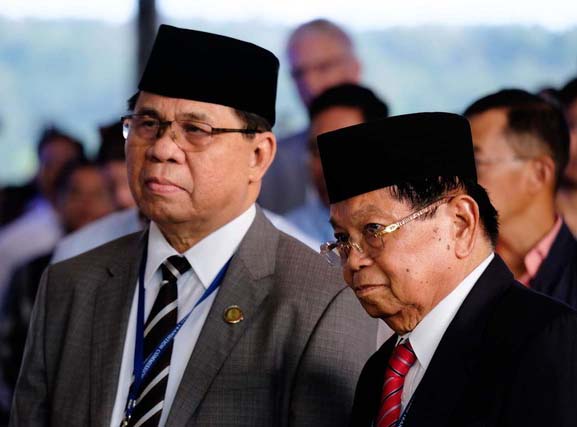
By Sofia Tomacruz in Sultan Kudarat, Mindanao
Battle-scarred they might be, the Moro Islamic Liberation Front have faced their toughest campaign yet.
Armed with nothing but a first-time vote, young troops from the Bangsamoro Islamic Armed Forces prayed they would win the decades-old struggle for autonomy and independence through yesterday’s ballot.
More than 150,000 former combatants of the MILF are among the 2.8 million people who have registered to vote in the plebiscite, where the ratification of the Bangsamoro Organic Law (BOL) and the creation of a new, expanded Bangsamoro region will be decided.
WATCH: Sofia Tomacruz’s video reports and live updates from Rappler

MILF leader Al Hajj Murad Ibrahim cast his vote for the first time in the historic referendum seeking to ratify the law that will give more autonomy to the Philippines’ Muslim minority.
The Bangsamoro Organic Law (BOL) is seen as the solution to the decades of separatist conflict in Mindanao, a region plagued by poverty and violent extremism, reports Arab News. More than 120,000 people have died in the conflict.
“This is my first time to vote,” said Murad. “During the height of the war, we never thought that this would happen. But after the progress of the peace process, we see that there is light at the end of the tunnel.”
It took the leader of the MILF, formerly the biggest Muslim group in the country, only a few minutes to case his “yes” vote.
First time vote
“I am happy that at least for the first time, I have exercised my right of suffrage,” he later said, adding that his participation in the voting signals the commencement of their transition from a revolutionary into the democratic process.
Like Murad, thousands of MILF fighters, along with their families, also trooped to polling centers yesterday to take part in the voting process, many of them for the first time.
“We are hoping that with this development, we can finally achieve the aspiration of our people for peace, progress and a good life in this part of the country and in the entire country,” Murad said.
Murad said that after the plebiscite, “hopefully the Bangsamoro Transition Authority (BTA), the transitional government, will be immediately established and we will start to organise our government structure and after the BTA, a regular government in 2022.”
Murad said that once the BOL is implemented, their priorities would be education, medical services, social services,and infrastructure, adding that education was their top priority.
“For more than 50 years of war, many of our people have not obtained education. We cannot really progress if our people are not educated,” he said.
Murad said that as long as the vote is conducted in a fair manner with no manipulation, intimidation or cheating, they are “determined to accept whatever is the result.”
Chief minister
A chief minister will head the BTA and this position will likely go to Murad.
Before he talked peace with the government, Murad was a fearsome MILF commander.
Murad’s decades of rebellion began in 1972 when he joined the Moro National Liberation Front (MNLF) led by former University of the Philippines professor Nur Misuari.
A group within the MILF disagreed with Nur over a peace deal with the government and broke away in 1981. This group became the MILF.
Murad became the head of MILF’s army, the Bangsamoro Islamic Armed Forces (BIAF). He commanded at least 12,000 men.
When MILF’s then-leader Hashim Salamat died in 2003, Murad took the reins.
After years of fighting government forces, the MILF began peace talks with the Arroyo and then the Aquino administration.
Signing witnessed
In 2012, Murad witnessed the signing of the Framework Agreement on the Bangsamoro, which laid the groundwork for the BOL.
The Philippines is a predominantly Catholic country but Mindanao has a significant Muslim population.
Many regard the region as their ancestral homeland, dating back to the 13th Century when Arab traders first arrived, and over the decades various rebel groups sprang up demanding the right to self-rule.
Mindanao has seen a huge amount of violence in recent years – mainly between the army, Muslim separatists and other rebels.
The violence has left Mindanao one of the poorest regions in the Philippines.
The entire region of Mindanao is still under martial law, which was implemented in 2017 after clashes between the army and militants linked to IS.The Philippines is a predominantly Catholic country but Mindanao has a significant Muslim population.
Ancestral homeland
Many regard the region as their ancestral homeland, dating back to the 13th Century when Arab traders first arrived, and over the decades various rebel groups sprang up demanding the right to self-rule.
Mindanao has seen a huge amount of violence in recent years – mainly between the army, Muslim separatists and other rebels.
The violence has left Mindanao one of the poorest regions in the Philippines.
The entire region of Mindanao is still under martial law, which was implemented in 2017 after clashes between the army and militants linked to IS.
If a majrity of the millions of voters from Maguindanao, Lanao del Sur, Basilan, Sulu, Tawi-Tawi, and Cotabato City voted “yes” include their areas in the Bangsamoro Autonomous Region of Muslim Mindanao (BARMM), a second voting day will take place on February 6.
This time, in Lanao del Norte – except Iligan City – and 7 towns in North Cotabato.
If a majority of voters in all areas agree to their inclusion, the new BARMM will be comprised of the provinces of Lanao del Sur, Maguindanao, Sulu, Tawi-Tawi, Basilan, Cotabato City, 6 towns in Lanao del Norte, and 67 barangays in North Cotabato.












































